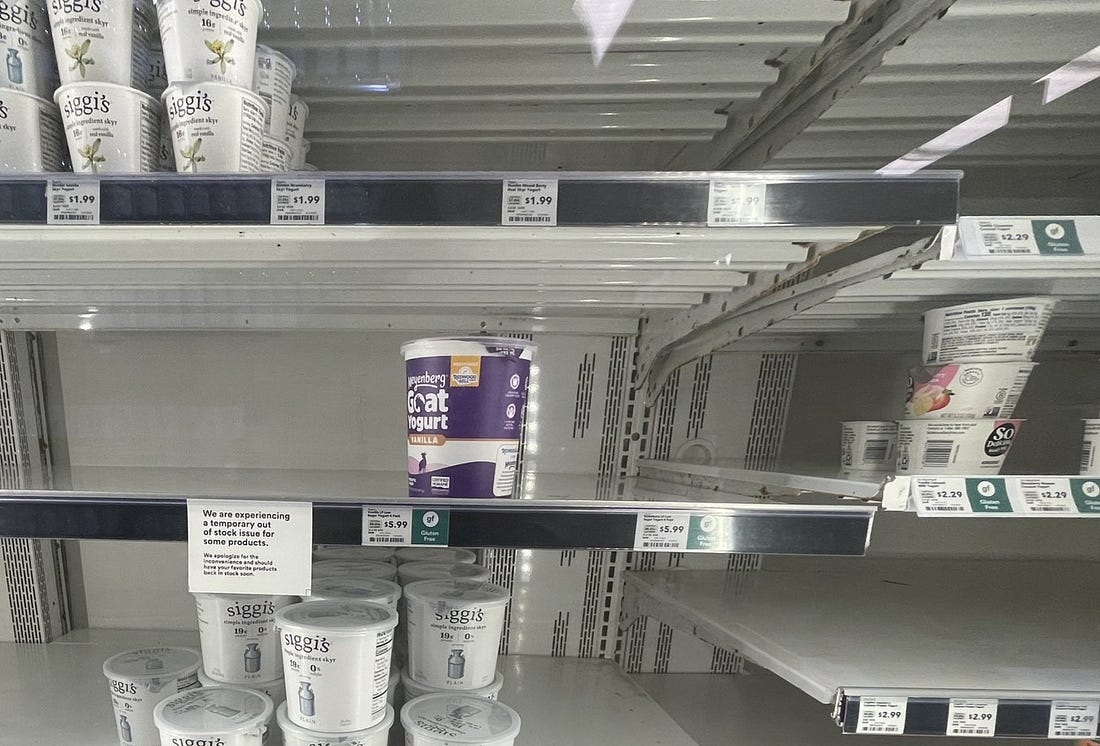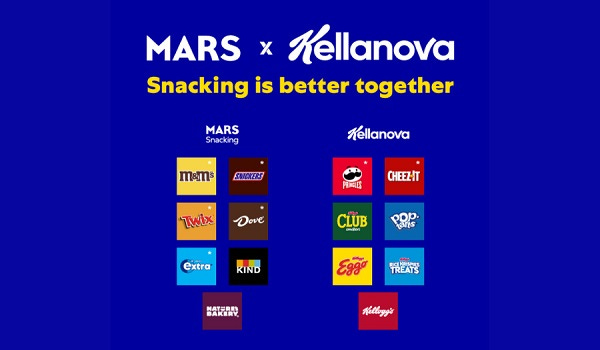Welcome to You’re Probably Getting Screwed, a weekly newsletter and video series from J.D. Scholten and Justin Stofferahn about the Second Gilded Age and the ways economic concentration is putting politics and profits over working people. Welcome to You’re Probably Getting Screwed, a weekly newsletter and video series from J.D. Scholten and Justin Stofferahn about the Second Gilded Age and the ways economic concentration is putting politics and profits over working people. COVID-19 helped expose how brittle our monopolized supply chains are, but a global pandemic is not the only way our economy can quickly break down. If you’ve headed to your local Whole Foods or maybe a grocery co-op recently it is possible you have been confronted by empty shelves. Like a poor immune system, those empty shelves are the result of an economy that is constantly one sneeze away from meltdown. Earlier this month, United Natural Foods Inc. (UNFI) was the victim of a cyberattack that took some of its systems offline. This has prevented the largest publicly traded grocery wholesaler from completing orders to the nearly 30,000 stores it supplies across the country. While cyberattacks are a common threat in today’s digital world, consolidation makes them much worse. As Forbes contributor Emil Savegh put it, “A single breach had turned into a national supply chain shock.” UNFI is the largest supplier to Amazon-owned Whole Foods and the retailer has experienced some of the most severe shortages from the cyberattack. But Whole Foods is not alone as thousands of independent grocers, co-ops and regional chains like Cub (which is owned by UNFI) were also impacted. Even fifty-three military commissary stores reported ordering delays as a result of the cyberattack. UNFI’s dominance, unsurprisingly, has been built through mergers and acquisitions. The most significant was in 2018 when as a response to Amazon’s purchase of Whole Foods, UNFI acquired Supervalu, a massive grocery wholesaler that owned several grocery chains including the aforementioned Cub and Shoppers Food and Pharmacy stores. UNFI had originally said it planned to divest itself of its retail holdings and did move quickly after acquiring Supervalu to sell or close some locations, but has mostly held onto that portfolio. Prior to the Supervalu purchase, UNFI had built its dominance in the natural and organic market by acquiring companies. According to an analysis by Claire Kelloway of the Open Markets Institute, between 2000 and 2018, UNFI acquired 19 distributors, manufacturers, and private label suppliers. For many small grocers and co-ops, the past few weeks have resembled COVID-19. Small businesses shelves are bare while companies like WalMart, which have their own in-house distribution networks, are fully stocked. The Community Food Co-Op in Bellingham, Washington, told customers at the height of the cyberattack to limit purchases to two of each item. This sort of thing can be devastating for small grocers whose margins are thin. In an interview with the Star Tribune, distribution expert Gregory Esslinger said the fragility of the grocery system is a national security issue. Yet further consolidation is on the way. One of the country’s other large wholesalers, C&S Wholesale Grocers, is looking to acquire SpartanNash for $1.77 billion. This would further limit the choices smaller businesses have and create more monopolized chokepoints in the food system. The Trump Administration’s antitrust enforcers seem happy to welcome further mergers. The FTC just announced that the $36 billion mega-merger between candy giant Mars and Pringles-maker Kellanova is not anticompetitive. This is despite, as Lee Hepner at the American Economic Liberties Project pointed out, the two companies have publicly touted how much overlap they have! Grocery is not the only industry with a poor immune system though, the entire economy is at threat of shocks from cyber security events. The 2024 cyberattack that crippled Change Healthcare, a UnitedHealth Group subsidiary, left local pharmacies across the country unable to fill prescriptions and hemorrhaging cash at a time when community pharmacies are already being crushed by pharmacy benefit managers (PBMs). Issues with Google Cloud a couple weeks ago created a massive internet outage because of Google’s dominant position in cloud computing. In 2023 a ransomware breach halted production and shipments at Dole Food Company, one of the world’s largest fruit and vegetable producers, causing its own set of grocery store shortages. We need an economy with a stronger immune system and that means creating a fairer and more distributed economy. We can do that by standing up to the merger waves that create these massive middlemen that in turn make the entire system vulnerable to attack. The current FTC and Department of Justice might be uninterested in doing that, but this is where bolstering the resources state attorneys general have can be impactful. Cracking down on the unfair pricing tactics that help drive consolidation in grocery is important step as well. While the Trump Administration seems uninterested in enforcing the Robinson-Patman Act, states can utilize existing price discrimination statutes or pass new ones like the Consumer Grocery Pricing Fairness Act in Minnesota. Limiting these chokepoints will help ensure that when one company gets screwed, we don’t all get screwed. YOU’RE PROBABLY (ALSO) GETTING SCREWED BY:UnitedHealth Group We’ve covered the ways UHG is cannibalizing our healthcare system and how UGH and other insurance companies profit off Medicare Advantage. Unfortunately, it sounds like HHS Secretary Robert F. Kennedy Jr could use a subscription.  Big Law More Perfect Union has a deep dive into the law firms that enable monopolists to loot our country. These firms are the “consiglieres of oligarchy.” You can also check out the People’s Parity Project for more info on how Big Law is screwing us.  The FTC FTC Chair Andrew Ferguson must have forgotten that his job is to enforce the antitrust laws, not ignore them. A $13.5 billion merger between two massive advertising firms was greenlit by the commission if the companies (Omnicom and Interpublic Group) agree to a consent agreement that bans steering ad dollars away from platforms or publishers based on “political or ideological viewpoints.” This is despite Omnicom laying off 3,000 people last year in anticipation of this merger and further layoffs being expected. Today the FTC is more concerned about protecting Elon Musk than everyday people. But that is not all the agency has been up to. Earlier this week they settled with Walmart in a massive wire fraud case. However, the settlement amounts to little more than a slap on the wrist instead of ensuring the permanent safeguards for consumers the commission was seeking under former Chair Lina Khan. To round things out, as mentioned above, the FTC has determined the mega-merger between Mars and Kellanova is somehow not anticompetitive. Making matters worse, the FTC gave the companies an “early termination” which means it did not even ask for additional information about the merger. As always, the good folks at More Perfect Union have a good overview of the potential harms from this combination.  Corporate Tax Breaks Earlier this year the Iowa Legislature, over JD’s strong objections, passed a $1 billion unemployment insurance tax cut that will primarily benefit the largest corporations in Iowa that layoff workers and ship jobs overseas. Well Congress must have been paying attention because the Senate has included a provision in the reconciliation bill that will reward private equity companies that gobble up small and medium-sized businesses, load them up with debt, and cut jobs. Each time politicians tout giveaways to the largest corporations they claim it will spur job growth and business investment, but it never comes to fruition. I’m reminded of the analysis below from the New York Times two years after Trump’s first corporate giveaway in 2017. SOME GOOD NEWSAnother Lina Khan Interview Last newsletter we shared the Pablo Torre interview with Lina Khan, today we have her in-depth discussion with conservative New York Times columnist Ross Douthat.  NYC & Small Businesses One storyline from New York State Representative Zohran Mamdani’s victory in the Democratic primary for New York City Mayor, is the emphasis his campaign put on lifting up small businesses. This has called attention to a phenomenal 2020 article from Stacy Mitchell at the Institute for Local Self Reliance arguing that progressives should build coalition with small businesses. Make sure to give it a read! BEFORE YOU GOBefore you go, I need two things from you: 1) if you like something, please share it on social media or the next time you have coffee with a friend. 2) Ideas, if you have any ideas for future newsletter content please comment below. Thank you. Break Em Up, Justin Stofferahn |





